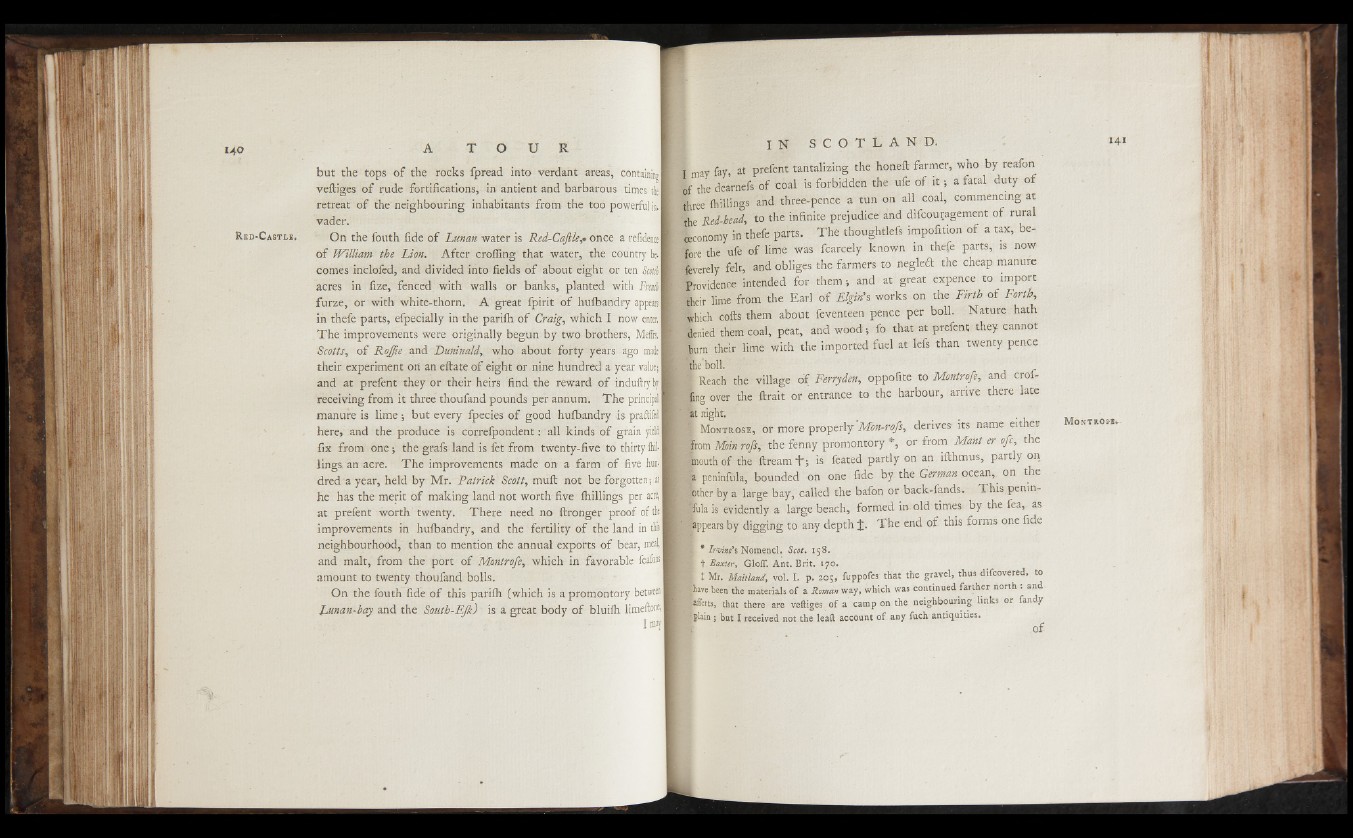
R ed - C a s t l e .
but the tops of the rocks fpread into verdant areas, containing I
veftiges of rude fortifications, in antient and barbarous times tit I
retreat of the neighbouring inhabitants from the too powerful ii. I
vader.
On the fouth fide of Luricm water is Red-Cajlle? once a refidencel
of William the Lion. After croffing that water, the country be-1
comes inclofed, and divided into fields of about eight or ten ScitA I
acres in fize, fenced with walls or banks, planted with Frail I
furze, or with white-thorn. A great fpirit of huibandry appears I
in thefe parts, efpecially in the parifh of Craig, which I now enter, I
The improvements were originally begun by two brothers, Meffis, I
Scotts, of Roffie and Duninald, who about forty years ago made]
their experiment ori an eftate of eight or nine hundred a year value;]
and at prefent they or their heirs find the reward of induftry by I
receiving from it three thoufand pounds per annum. The principal
manure is lime ; but every fpecies of good huibandry is praftifed
here, and the produce is correfpondent: all kinds of grain yield]
fix from one; the grafs land is fet from twenty-five to thirty billings
an acre. The improvements made on a farm of five hundred
a year, held by Mr. Patrick Scott, mull not be forgotten; as
he has the merit of making land not worth five ihillings per acre;
at prefent worth twenty. There need no ftronger proof of the
improvements in huibandry, and the ferdlity of the land in this,
neighbourhood, than to mention the annual exports of bear, meal,
and malt, from the port of Mantrofe, which in favorable feaions
amount to twenty thoufand bolls.
On the fouth fide of this pariih (which is a promontory between
Lunan-hay and the Smth-EJk) is a great, body of bluilh lim e iM
Imaf
I may fay, at Prefent tantalizing the honeft farmer, who by reafon
of the dearnefs of coal is forbidden the ufe of i t ; a fatal duty of
three ihillings and three-pence a tun on all coal, commencing at
the Red-head, to the infinite prejudice and difcouragement of rural
economy in thefe parts. The thoughtlefs impofition of a tax, before
the ufe of lime was fcarcely known in thefe parts, is now
feverely felt, and obliges the farmers to negleft the cheap manure
Providence intended for them and at great expence to import
their lime from the Earl of Elgin’s works on the Firth of Forth,
which coils them about feventeen pence per boll. Nature hath
denied them coal, peat, and wood -, fo that at prefent they cannot
burn their lime with the imported fuel at lefs than twenty pence
the'boll.
I Reach the village of Ferryden, oppofite to Montrofe, and crof-
fing over the ftrait or entrance to the harbour, arrive there late
it night.
I Montrose, or more properly 'Mon-rofs, derives its name either
jiirom M/in rofs, the fenny promontory *, or from Mant er ofc, the
-inouth of the ftream’f"; is feated partly on an iithmus, partly on
K peninfula, bounded on one fide by the German ocean,^ on the
Rther by a large bay, called the bafon or back-fands. This penin-
fula is evidently a large beach, formed in old times by the fea, as
■¡ppears by digging to- any depth J. The end of this forms one fide
K * Irvine*s Nomencl. Scot. 158.
■ t Baxter, Gloff. Ant. Brit. 170.
I X Mr. Maitland, vol. I. p. 205, fuppofes that the gravel, thus difcovered, to
Hbave been the materials o f a Roman way, which was continued farther north : and
Hafferts, that there are veftiges o f a camp on the neighbouring links or fandy
■plain j but I received not.the leaft account o f any fuch antiquities.
of